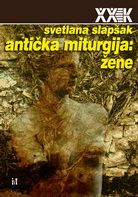Antička miturgija: žene
Ancient mythurgy: Women
Author(s): Svetlana Slapšak
Subject(s): Anthropology, Social Sciences, Gender Studies, Sociology
Published by: Biblioteka XX vek
Summary/Abstract: „Daddy, you are a myth.“—Laura. I saw a memorial notice with this text on the notice board of a small church outside the town of San Severino, in the Italian province of Marche, in September 2009. Laura informed everybody who read the notice, a well as her deceased father, that he had become a myth. He qualified to be a myth by virtue of the fact that he died. Butt hat is not the only possible interpretation: it is also possible that Laura’s father had already been a myth before he died, and that he had to be reminded of it after his death. Or that he did not know that he was a myth and that it was time, at last, that he be informed. In any case, death is the most important, and possibly the only, condition for entry into myth – but to actually accomplish entry it is necessary to have the help of the person who announces and legitimises the entry. The informer, or if you prefer the legitimator, is therefore the main figure in the creation of myth. Laura’s intervention is essential if we understand myth as a set of everyday gestures of remembrance, in which the individual participates freely and criteria are not imposed. In any event, this anthropological datum is consistent with the approach of the most prominent schools of thought on myth and mythology, in particular the two authors who I consider to be my main teachers on the topic, Roland Barthes and Jean-Pierre Vernant.
Roland Barthes fundamentally grasped the concept of myth, because he drew the connection between the everyday manipulation of myth and the dominant and prescriptives modes of (mythic) narration. [1] By doing so he opened up the possibility of tying together the everyday production of myths with the modes of myth production in the past. Unfortunately, specialists in ancient mythology do not make use of this possibility. For the most part they have remained in the theoretical fields that operate with elevated ideas about mythology: mythology as the source of collective identities in the worst case, or in a somewhat better case mythology as a source of knowledge about early civilisation ort he history of consciousness. Jean-Pierre Vernant was sharply critical of this type of thinking, on the ground that a thinker and researcher looking from the point of view of the present in the absence of self-reflexivity constitutes the negation of a critical perspective: the object of his criticism in particular was Mircea Eliade and his psychoanalytical approach. He did not draw associations to Barthes’ conception of everyday production of myth. The intervention by Barthes is broader, and takes the traumas of the modern age as given. For his part, Barthes understands myth as a constant, permanent psychologigal inscription of myth, by way of which culture is necessarily transformed into „nature,“ and the person of western culture (whatever that may mean) is attributed a kind of anthropological universality, in the form of an insistent and highly stereotyped abuse on the part of discourses connected with power. Barthes distinguishes three types of readings of myth: there is the orientation toward the empty signifier, when the signified regains meaning in the form of a symbol – this ist he construction of myth through the search for a form for an exiting concept; there is the orientation toward the full signifier.
- Print-ISBN-13: 978-86-7562-113-3
- Page Count: 310
- Publication Year: 2013
- Language: Serbian
- eBook-PDF
- Introduction
- Sample-PDF
- Table of Content

